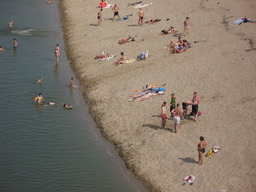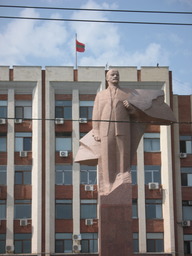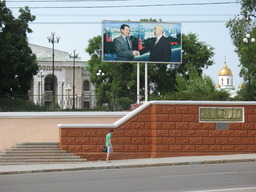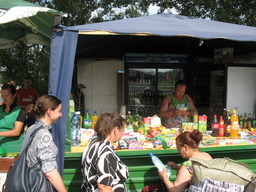
River Dniestr
 River Dniestr |
"It's the last remnant of the Soviet Union; they still have statues of Lenin and a hammer and sickle on their flag... "
"When we crossed the border last time, we had to pay a 50-euro bribe to exit the country... "
"Trust nobody... "
Transdniestria's sketchy reputation is either exaggerated or outdated. Everything I'd heard before arriving here made the country sound like a spooky, paranoid territory frozen in time. Thankfully, everything I'd heard also turned out to be wrong.
 Transdniestrian Flag Flies above Lenin |
Transdniestria and Abkhazia came into existence with the collapse of communism in the early 1990s. The borders laid-down in days back when the U.S.S.R. was all one big country could ignore finer details of the smallest regions where minority ethnicities lived. This sloppy cartography meant that upon break-up of the Soviet state these smallest territories were lumped into other newly independent nations: nations run by other peoples with other cultures who spoke other languages.
Abkhazia, a region mostly populated by ethnic Abkhaz, wound up falling into Georgia. Transdniestria, a region mostly populated by ethnic Russians, wound up falling into Moldova. I don't think any other country on this planet recognizes the autonomy of a Transdniestrian state. (Maybe Russia does? Maybe?)
From the street level, Transdniestria seems to be doing fine going it on its own. The infrastructure feels par with that of the country from which it split off, Moldova. Shops are well-stocked with goods from Russia. Streets are tidy and well-kept. It even has its own currency, the Transdniestrian ruble. Walking down the street, Tiraspol feels no different from most other cities I've visited in eastern Europe. None of the advice to "watch your back" or to "be careful about shooting photos, no matter the subject" turned out to be worthwhile.
 Central Tiraspol |
We did have to register. We plan to stay in Tiraspol for a total of two nights. Registration turned out to be a mildly bureaucratic process though one that cost us nothing. A few years ago there was some sort of "visa fee" to register oneself upon arrival into the country. I'm not sure whether that fee was really official. Back in those dodgier days, Irina made a short trip here. She had to pay not only the "visa fee" but was also demanded 50 euro upon departure, just to be allowed to exit the country. So, it is possible that we may encounter graft and sticky fingers on our way out--but yet far everything here feels fairly straightforward.
I suppose neither of us have any connection to the depths of whatever is really going on in this quasi-country. Transdniestria is renowned for smuggling and arms trafficking. Weapons were manufactured in factories here during Soviet days; it's rumored that those plants are still functional. But, as casual tourists, Irina and I are less aware of any munition manufacture and more enjoying the fusion of Russian and Moldovan items available on restaurant menus. The staples of our dinner last night were shashlik (kebabs) and mămăliga (cornmeal mush).
 Beer and Kwas Stall above Riverbank |
We're now in pursuit of products from another local brand, Kvint. Irina recalls drinking some fine cognac produced by Kvint Co. the last time she was here. We're hoping to pick up a couple bottles before we cross out of Transdniestria.
We'd better find our brandy soon. We'll be moving along tomorrow.
Next stop: Odessa